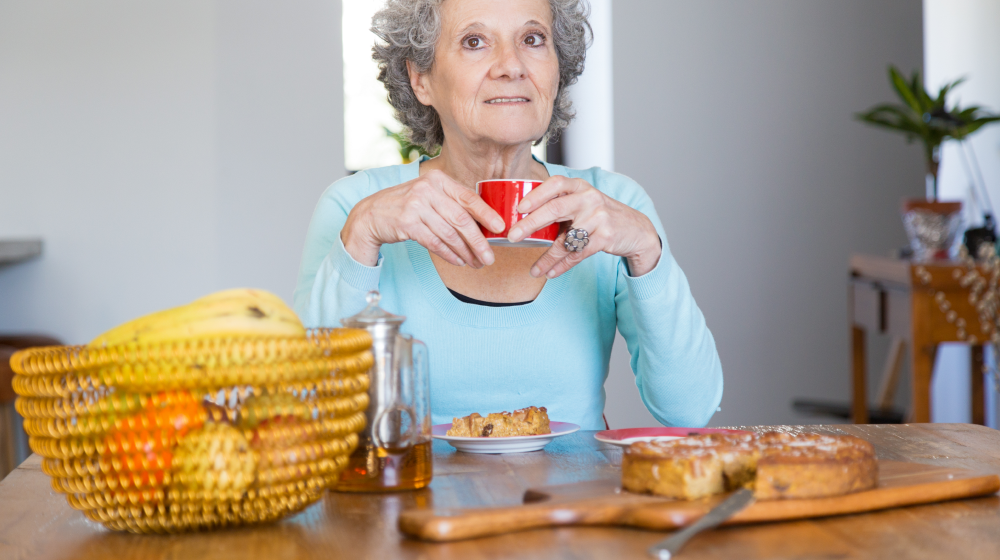Brain Feeding: How to Use Nutrition to Support Cognitive Function and Dementia Prevention in New York
Dementia, as a major public health concern, is becoming a significant issue for aging populations across the United States. The New York State Department of Health reports that over 410,000 New Yorkers have Alzheimer’s disease or some other type of dementia, and the numbers are expected to drastically increase to over 730,000 people by 2030.
While there has been no established method to completely stop dementia through diet alone, the research indicates that nutrition is a vital factor in slowing cognitive decline, reducing symptoms associated with depression, and improving overall quality of life for individuals with dementia. Understanding the “brain-feeding” process will become as important for families and caregivers of dementia patients as will medications and therapies.
HHA at Angel Care Home Care Agency Inc., provides its home care clients with a balanced combination of physical and mental well-being by integrating nutritional awareness into all of our home care services, so each meal contributes not only to the client’s physical health, but also to their mental health.
Nutrition and Brain Function
Since the brain requires approximately 20% of the body’s entire energy to continue to function properly, it is necessary for the brain to receive an ongoing supply of nutrients to continue to think clearly, remember and experience a normal mood. However, for individuals with dementia, this balance is often lost due to changes in metabolic function, appetite and sensory perception.
Research conducted at Harvard Medical School and the National Institute on Aging (NIA), has shown that diets high in antioxidant compounds, omega-3 fatty acids, and vitamins B6, B12, D and E can help to maintain cognitive functions and slow down the development of neurodegenerative diseases.
“What is good for the heart is good for the brain,” states Dr. Laura Chen, neurologist at Mount Sinai Hospital in New York, noting that proper nutrition improves blood flow to the brain, reduces inflammation and supplies the neurons needed to store memories.

The MIND Diet: A Scientifically Proven Method to Promote Brain Health
One of the most researched methods to promote brain health is the MIND diet, which stands for Mediterranean-DASH Intervention for Neurodegenerative Delay. The MIND diet was created by researchers at Rush University by combining two of the best known diets for promoting health: the Mediterranean and DASH diets. These diets emphasize plant-based and low fat/low sugar foods.
| Recommended Foods | Benefits for the Brain | Frequency |
| Green Leafy Vegetables (Spinach, Kale, Broccoli) | Antioxidants and Vitamin K help to slow cognitive decline. | at least six servings per week |
| Fruits (Blueberries, Strawberries) | Flavonoids found in blueberries and strawberries protect brain cells. | 2+ times per week |
| Grains (Quinoa, Oats, Brown Rice) | Stable glucose to fuel brain energy. | daily |
| Fish (salmon, sardines, trout) | Omega-3 fatty acids help to heal damaged neurons. | one to two times per week |
| Olive oil | Heart-healthy and anti-inflammatory | main cooking oil |
| Nuts and seeds | Vitamin E, Magnesium and healthy fats to support brain cell membrane. | a handful daily |
| Beans and lentils | Plant-based protein and fiber to support steady brain energy. | three+ times per week |
| Chicken | Supports neurotransmitters. | 2+ times per week |
| Limited red meat, cheese, butter, sweets | Helps to reduce vascular stress and inflammation. | use sparingly |
Because the MIND diet is not only beneficial, but also sustainable, for many older adults in New York with dementia, it is a viable option.
Strategies to Aid Families and Caregivers
For family members caring for a loved one with dementia, you may find these practical and scientifically supported recommendations helpful:
- Create Consistent Meal Times — Consistency Helps Reduce Confusion and Anxiety.
- Provide Smaller Portions — Large Plates May Overwhelm the Individual and Discourage Eating.
- Provide Finger Foods — Easier to Handle Than Larger Portion Sizes.
- Use Colorful Tableware — White Plate on Dark Table Makes Food More Distinct.
- Include Memory-Friendly Ingredients — Blueberries, Walnuts, Avocado, Turmeric and Salmon.
- Use Processed Foods Sparingly — Trans Fats and Added Sugars Increase Inflammation.
- Drink Frequent Hydration — Offer Water-Rich Foods Like Soups, Fresh Fruit and Herbal Teas.
- Maintain Calm Environment When Dining — Minimize Distractions.
Each of these methods can greatly alter a daily meal from being simply a necessity into a time of comfort, love and emotional stability for both the caregiver and the individual with dementia.
How to Supports Cognitive Nutrition
At Angel Care Home Care Agency Inc., we provide comprehensive care to individuals with dementia by combining home care with nutritional awareness and mental stimulation.
Our caregivers and care coordinators provide:
- Nutrient-dense meals tailored to meet specific dietary requirements and health conditions;
- Safe feeding and hydration practices to avoid malnutrition;
- Reminders to ensure that medications and supplements are taken consistently;
- Opportunities for social interaction and cognitive stimulation through cooking together or talking about shared meal traditions;
- Coordinate with physicians and registered dietitians to continually assess the client’s nutritional status.
“It Is Important That Every Bite Not Only Provides Energy for the Body, But Also Strengthens the Mind,” says Angel Care’s Registered Nurse Supervisor. “That is What True Person-Centered Care Means.”
The New York Perspective: Access to Resources and Education
Community resources to support dementia nutrition exist throughout New York City, including programs provided by the Alzheimer’s Association NYC Chapter, Meals on Wheels, and several local senior centers. However, for many families, coordinating these services can be daunting, especially considering the responsibilities of working, caregiving, and managing finances.
Therefore, having a reliable agency such as Angel Care Home Care makes a substantial difference. We provide families with resources and information regarding local food delivery programs, Medicaid nutrition benefits, and additional sources of supplemental feeding to ensure that no senior in our care is left without support or nourishment.
Conclusion: Nurturing the Mind
Feeding the brain is a metaphor for feeding hope. Proper nutrition cannot prevent or treat dementia, but it can slow the rate of decline, elevate mood, and improve the overall quality of life for individuals with dementia. When families have the knowledge of nutritious meal planning, and the consistency of mealtime routines, combined with compassionate and supportive home care, seniors can thrive in their own homes, maintain their dignity and enjoy a comfortable existence.
At Angel Care Home Care Agency Inc., we strive to help families across New York, develop a balance between home care services and empathy, nutrition and human connection.

Fall is here in New York and while many of us will soon be able to snuggle up with warm blankets and cups of tea, some of us will be reaching for something else that has been a staple of fall routines for years; heating pads. For many seniors, heating pads offer relief from their joint pain, stiffness and muscle aches which tend to increase as the weather gets cooler. But, despite its familiarity, using a heating pad is not always safe for every senior. This article will discuss when and how heating pads can be an asset for seniors, why they should be avoided and how professional caregivers such as those at Angel Care Home Care Agency Inc. (NY), can assist in providing safe, therapeutic heat during the fall and winter months. Why Seniors Love Heating Pads The fall season brings much more than changing leaves. Many older adults experience muscle tension, increased arthritis discomfort or poor circulation as the weather gets cooler. Direct application of heat to a specific area can greatly benefit seniors. It increases blood flow, loosens tight muscles and temporarily relieves pain. Heat therapy, according to the Arthritis Foundation, “loosens tissues and stimulates blood circulation, making movement easier and less painful.” The success of heat therapy however is dependent upon the duration and method of heat application. "Heat can be very comfortable for the body, but it should never be a risk to the skin or circulation." — Dr. Michael Nguyen, Geriatric Care Specialist, NYU Langone Health Benefits of Heating Pads for Seniors When utilized properly, heating pads can be a valuable tool for both comfort and pain management for seniors. Some of the main benefits include: ✅ Increased Blood Flow Heat causes blood vessels to dilate allowing more oxygen to reach sore or stiff muscles and joints. ✅ Relieved Muscle Tension Gentle heat applied to the affected area can ease muscle spasms and cramps, especially in the lower back, shoulders and knees. ✅ Faster Recovery After Exercise Low to moderate heat applied after physical activity or therapy can promote relaxation of the muscles and prevent inflammation. ✅ Non-invasive Pain Relief Chronic pain sufferers find that low to moderate heat applied to the area of the body experiencing chronic pain can provide relief from pain without the need for prescription medications or therapy. Risks and When to Use Heating Pads with Caution While heating pads do offer several benefits for seniors, there are also several risks associated with them — primarily for seniors with chronic medical conditions or thin, fragile skin. According to hospital reports in New York, many minor burns experienced by seniors in their homes are caused by improper use of heat therapy. Below is a summary of when heating pads should not be used or should be used with extreme caution: Condition / Situation Caution Reason Diabetes or neuropathy Since diabetics and individuals suffering from neuropathy have diminished sensation, they may not be aware of when skin is burning. Cardiovascular disease Excessive heat can cause fluctuations in heart rate and blood pressure. Poor circulation Exposure to prolonged heat can cause further tissue hypoxia (oxygen deficiency) Skin Fragility/Wounds Individuals with thin or damaged skin are at greater risk of sustaining burns. Sleeping With a Heating Pad Using a heating pad during sleep creates a risk of either overheating or causing accidental injury It is also suggested that seniors refrain from using old heating pads without automatic shutoff features. Electrical safety and regulated temperature control is essential, especially when using electric heat appliances in multi-unit dwellings such as apartments found commonly throughout New York City. Recommended Safe Practices for Heating Pad Usage at Home To allow seniors to enjoy the comforts of heat therapy while minimizing the risk of injury or burn, consider the following safe practices: Check the Temperature — It Should Feel Warm, Not Hot Use for Short Intervals — Typically 15-20 Minutes at a Time Do Not Apply Directly to Bare Skin — Use a Towel or Protective Layer Do Not Use Over Swollen, Bruised, or Inflamed Areas Choose Modern Devices — Automatic Shutoff Features & Adjustable Settings Consult a Doctor or Home Caregiver Before Using Heat Therapy If You Have a Chronic Condition "The right balance between comfort and safety is what makes a big difference for seniors during colder seasons." The New York Context: Combining Comfort and Safety Residing in New York means dealing with unexpected temperature fluctuations. A sudden drop in temperature can exacerbate arthritis, increase stiffness in the joints or hinder movement for older residents — especially those living in older buildings with spotty heating. Professional caregivers play a vital role in assisting seniors with heat therapy. They not only ensure that seniors utilize heating pads correctly and safely, but also help seniors maintain their activities of daily living, hydration levels and warmth through safe, holistic caregiving practices. Angel Care Home Care Agency professionals ensure: Heating devices are used properly and safely; Alternative warming methods (such as warm compresses, gentle stretching, layered clothing and/or thermal socks) are available to seniors; Seniors remain comfortable without being exposed to excessive heat or dehydration. Alternatives to Heating Pads For seniors who cannot safely use direct heat therapy, alternatives can be just as effective in providing comfort: Warm Baths/Showers — Increase circulation and flexibility; Heated Blankets — Provide consistent low heat; Massage Therapy/Gentle Stretching — Relieve natural stiffness in the muscles; Thermal Socks/Layered Clothing — Prevent chill without exposing the skin to heat; Hot Water Bottles (with Covers) — Simple, Low-Tech, Gentle Heat. Each alternative provides comfort without the risk of electrical heat exposure. A Message from Angel Care Home Care Agency Inc. At Angel Care Home Care Agency Inc., we firmly believe that comfort and safety should be mutually inclusive. Our goal is to provide quality, compassionate, in-home care to seniors throughout New York — keeping seniors safe, warm and active throughout the fall and winter months. Our professionally trained caregivers assist clients with managing seasonal changes by: Creating personalized home comfort plans; Supervising safe usage of heating/mobility devices; Assisting with daily routines and medication; Providing companionship to prevent loneliness and promote overall well-being. "Comfort is not just about being warm — it's the sense of being cared for, attended to and connected." If your loved one is living alone or experiences challenges with mobility this fall, our caregivers can provide the assistance your loved one needs to comfortably live at home without risk. Angel Care Home Care Agency Inc. — supporting the safety, care and warmth of New York's seniors, in their own homes.

The future of care for thousands of families in New York is uncertain: Will my insurance cover home care in 2026? Increasingly, families are seeking safe, more personalized and less expensive options than traditional assisted living as they transition through the aging process. Navigating the insurance system – Medicare, Medicaid, long term care policy, and private insurance – has become an extremely confusing experience. Below is a detailed explanation of the home care services insurance coverage in New York, the anticipated changes in 2026, and recommendations for families to create a well-planned strategy for securing high quality care for your loved ones. Growing Need for Home Care in New York By 2030, nearly 1 in 5 people in New York will be 65 years old or older, and a significant number of those individuals will require some sort of daily assistance. The past two years have increased the demand for in-home services due to fear of contracting COVID-19, personal choice, and cost savings. More and more families are electing to have home care for their loved ones so they can stay comfortable, independent, and accompanied while reducing the emotional impact of relocating to nursing facilities. How Insurance Pays for Home Care in New York Coverage varies greatly depending on the type of insurance. Some services are covered under Medicare or Medicaid; however, the majority of long term care requires private coverage or is paid out of pocket. Below is an overview of the types of insurance available today -- 2025 -- with projections for 2026. Type of Coverage What It Includes Limitations / Notes for 2026 Medicare (Original) Short-term skilled nursing, physical therapy (PT), occupational therapy (OT), and in-home short-term home health care. Only covers medical home care -- does not include personal assistance, cooking, cleaning, and companionship. Medicare Advantage (Part C) Includes optional limited in-home support and wellness programs depending on the plan. Most NYC plans expanding coverage for non-medical support under new federal guidelines. Medicaid (New York) Covers personal care, home attendants, and 24-hour support through programs like CDPAP (Consumer Directed Personal Assistance Program). Eligible based on income and medical need. Expected to expand digital monitoring support by 2026. Long Term Care Policy Customizable plans covering daily living assistance, personal care, and home modification. Premiums vary; policies must be purchased prior to medical need. Veterans’ Benefits (Aid & Attendance) Benefits for veterans and spouses requiring assistance with daily living needs. Must be approved by VA; coordination with home care agencies recommended. Anticipated Developments in 2026 New York's healthcare legislation is moving to address the state's rapid growth of its elderly population and the lack of caregivers for them. Three major trends are expected in home care coverage by 2026: Increased Funding for Alternative Medicaid Programs: The state is expected to fund more home-based care alternatives to nursing home care through Medicaid Managed Long Term Care (MLTC) and CDPAP. Expanded Medicare Flexibility: Recent federal changes now permit Medicare Advantage plans to pay for non-medical home services such as meal delivery, transportation, and home safety modifications — a huge shift towards prevention. Hybrid Models Combining In-Person and Virtual Health Supervision: Private and public programs are starting to implement hybrid models of in-person care and virtual health supervision. These hybrid models are expected to decrease costs and expand eligibility for home care for seniors who live independently. When Insurance Is Insufficient Although there are expected changes, insurance typically does not cover 100% of home care costs. Most families incur additional costs such as co-payments, service hour limitations, or tasks that are not covered by insurance such as housekeeping and companionship. Common Out of Pocket Costs That New York Families Still Encounter: Additional hours of a caregiver beyond insurance limits; Nighttime or weekend support; Specialized assistance with dementia or post surgical recovery; Transportation and errands; Emotional and social companionship. That is why most families use insurance to cover skilled services (i.e. wound care, PT/OT) and then use private pay for personal care services to ensure continuity of care. Why Home Care Remains the Most Cost Effective Solution for New York Families in 2026 Choosing home care will continue to provide the most cost effective and emotionally rewarding option for New York families in 2026. Consider the following: The average monthly cost of a nursing facility in New York exceeds $15,000-$17,000, Average monthly cost of home care is between $5,000-$7,000 — may qualify for partial reimbursement from insurance. Home care also offers something that nursing facilities do not: familiarity, routine and peace of mind. One of our Angel Care clients shared the following: "My mom stays in her apartment in Brooklyn, she drinks her morning coffee and chats with her caregiver — that is priceless." Final Thoughts: Plan Now for 2026 There will be continued change in the healthcare industry in the upcoming year with a growing focus on aging at home. Insurance systems will begin to adapt to these trends. Proactive planning will remain the best course of action for families to take advantage of the changing landscape. Families should: Review their current Medicare, Medicaid or private insurance coverage; Discuss eligibility for programs like CDPAP; Seek guidance from licensed home care agencies familiar with New York's laws and regulations. A Message From Angel Care Home Care Agency Inc. At Angel Care Home Care Agency Inc., we believe that every senior deserves caring, affordable, and safe care — in the comfort of their own home. We assist clients in navigating insurance options, developing customized care plans and providing support so that no family member has to go through the challenges of aging or illness alone. We are proud to offer trusted home care services to the citizens of all New York City Boroughs with honesty, compassion and expertise — making home the safest place to be. Angel Care Home Care Agency Inc. — Helping Families Live Better, Longer and Together.



